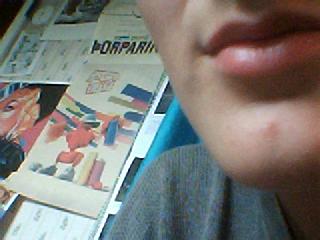The Female Man / Honmänniskan
I've Just finished a Swedish translation of The Female Man by Joanna Russ, who passed away earlier this year. It was a good read. The novel was nominated in 1975 to the Nebula Award, probably the greatest award for science fiction literature in USA.
The book is partly about travelling in time and between dimensions and is written by an angry, lesbian feminist. Russ is by far my favourite feminist theorist in science fiction literature and I warmly recommend her works, for instance How to Suppress Women's Writing. Her texts are clever, witty and really funny. Still, I found this book on the library sale.
...ok. Both science fiction and feminism are small fields, not to mention a combination of them. And the book has gotten old. Thoughts and currents develop and the new ones replace the old ones. But the book's age is, in fact, one of the things I like most about it. For me it summarizes many thoughts of the feminist movement at this time, and the mere genre it is written in is worth mentioning. When I wrote my BA thesis this spring (yet to be published, in Swedish though) I learned that genres such as science fiction and fantasy are someties used by feminist writers as a means to create and discuss alternative relationships between men and women, as well as “utopias” where women have taken over. In The Female Man Russ presents both the world where there are only women, which is good but hardly perfect, the future where there is a war of the sexes and men and women only meet to exchange goods, services and babies; the world as it was when the book was written and a more old-fashioned world. We get to know one women from each of these four worlds, and they meet of a reason told towards the end of the book.
I know I wrote earlier that the book has gotten old. Unfortunately, women are still facing widespread sexism and many of the same problems as in the beginning of the 70's, spite an ongoing feminist movement for the last... wow. More than 40 years. In fact, Russ ends the book by expressing the wish that the discussions in the book will once become old and impossible to relate to, laughed at and out-dated.
“Gläd dig, lilla bok!
För den dagen är vi fria.”
The reader is among other things told about the blame that is put on the victims of rape, highlighted today in slut walks across the world. Women were and still are objectified and being told that being ugly is one of the worst things a woman can be: “Det var den hemliga skulden för sjukdom, misslyckande, fulhet (mycket värre saker än mord)” (s. 188).We read about men refusing to accept that there are some women out there who only prefer women. ONLY women. “'Drömmer du inte om det? Drömmer inte alla tjejer om det?' 'Det vet du, Lenny', sade hon. 'Visst gör jag det', sade han entusiastiskt. 'Visst. Det ser jag på er varenda gång ni kommer hit. Ni blir upphetsade bara ni ser det. Som läkarna säger kan vi göra det med varandra, men det kan inte ni, eller hur? Så ni får inget.'” (s. 164-165)
For instance.
The male people in the book are very stupid and more or less helpless, and all grim and selfish, except for the beautiful android sex-slave. One might react to this, saying “ok, she is an angry feminist and into women and all that but hey! men are not all that bad, there are nice guys out there”. True. But if we think about it, couldn't it be that by making a whole sex stupid and helpless, the author wants to tell us something about the characterization in too many other texts that we read?
I'd like to stress here, at the end, that the book doesn't give any answers. Russ does not point out the way for us, but she raises questions about what it means to be a Woman; today, back then and in a possible future. And she does it with anger, love and humour.
Finale.
”Den lilla blå anteckningsboken skramlade runt i min ficka. Jag tog fram den och slog upp den på det sista han hade sagt ('Din korkade brudjävel' et cetera). Under stod det: Flickan backar undan – gråter – manligheten hävdad. Under 'Riktigt Slagsmål Med Flicka' stod det: Skada inte (utom horor). Jag tog fram min egen rosa bok, för vi har varsin allesammans, och när jag slog upp instruktionerna under ”Brutalitet” stod det: Mannens dåliga humör är kvinnans fel. Det är också kvinnans ansvar att lappa ihop det hela efteråt.” (s. 52)
Labels: books, feminism, literature, science fiction


2 Comments:
låter superintressant!
för övrigt angående feminism; varje gång jag läser eller ser världen m. feminstiska glasögon blir jag en gnutta bittrare. jag sa till marita för någon vecka sedan att jag ville bli kvinnofridshandläggare. marita som har varit aktiv inom kvinnojourer sedan många år svarade mig: "vakta dina tankar bara så att du inte blir bitter". så, tips på att stoppa bitterheten när man känner att den ligger nära till hands?
Jag har nu funderat på det.
Själv skulle jag nog/förhoppningsvis försöka vidga mina perspektiv eller fokusera på annat om jag kände att jag blev för bitter. Till exempel:
*Träffa trevliga manliga vänner
*Göra någonting som får en att skratta
*Skratta åt hur mycket som finns kvar i kampen för jämställdhet, hur löjligt människor kan bete sig på grund av invanda mönster
*Undvik i det längsta förhållanden (särskilt med män)
Post a Comment
Subscribe to Post Comments [Atom]
<< Home